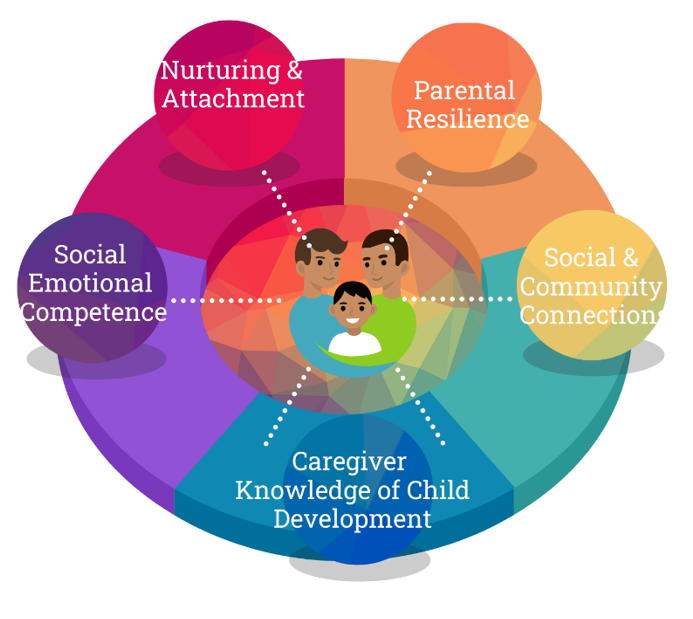Optimal early childhood development has consistently been linked to Family Strengths and Protective Factors– Parental Resilience, Social Connectedness, Knowledge of Parenting and Child Development, Concrete Support in Times of Need, and Social-Emotional Competence of Children. These factors are known to reduce the negative impact of risk factors or adverse experiences, build resilience, and support environments that allow children to thrive.
Bright Futures recommends promoting and assessing family strengths during each well-child care visit along with screening for optimal child development.
Read more about protective factors:
- Center for the Study of Social Policies Protective Factors Framework
- Protective Promotive Factors worksheet
- Children’s Trust Fund Alliance Parent Resources Protective Factors
- Healthy Outcomes from Positive Experiences (HOPE)
- CAHMI Early Childhood Cycle of Engagement
- Great Start collaborative: Remembering the family protective factors
Social-emotional Competence
Early childhood is a period of both great opportunity and vulnerability. School readiness often focused on physical and cognitive development. However, social emotional development is equally important as it builds:
- self-esteem/self-confidence
- self-efficacy
- self-regulation
- executive functioning
- intrinsic motivation
- conflict resolution
- social and communication skills
Social-emotional Development Screening: Social-emotional development screening tools are better at identifying young children at risk for behavioral and social-emotional issues than broad developmental screening tools. Pre-pandemic, 1 in 6 children ages 2-8 had an unidentified mental health concern.1 Find appropriate social-emotional screening tools. (Link to social-emotional screening page in clinical practice)
Social Emotional Screening webinar with Dr. Mary Margaret Gleason MD, FAAP
1. CDC Data and Statistics on Children’s Mental Healthv
Caregiver knowledge of Child Development
An understanding of how their child grows and develops can establish realistic expectations for child behavior at all ages. Parents who experienced harsh discipline or other negative childhood experiences may need extra help to change the parenting patterns they learned as children.
All caregivers can benefit from increasing their knowledge and understanding of child developing including
- Physical, cognitive, language, and social emotional development
- Signs of developmental delays and where to turn for help
- Healthy discipline and strategies to impact child behavior
Developmental Screening
Universal recommended early childhood developmental screening serves as a tool to center developmental discussion and planning with families to promote, prevent risks, or repair optimal development. The Screening Technical Assistance & Resource Center (STAR Center) supports pediatricians to improve recommended early childhood screening, counseling, referral/linkage, and follow-up for developmental milestones, perinatal depression, and social drivers of health.
Social Connections
Families’ support structure including extended family, friends, and community supports are valuable resources for resilience. Asking families questions like “How are you coping?” and “Who supports you?” can help assess strengths of family networks and areas that may require additional support.
Parental Resilience
A parent’s resilience can affect how they manage stress. Resilience is the ability to manage stress and function well even when faced with challenges, adversity, and trauma. Families are more likely to achieve healthy outcomes and maintain healthy relationships if they are resilient.
Nurturing and Attachment
Attachment is a component of a nurturing relationship between a child and their caregiver(s). Secure attachment forms in an environment that supports the child’s sense of security and safety.
Children with secure attachment:
- Trust that their needs will be met by caregivers allowing them to explore their environment and build new skills or relationships.
- Build skills to self-regulate their emotions
- Learn to communicate in more complex and sophisticated ways
Perinatal Depression: Depression in a parent is known to have a profound effect on infants and other children in the family. A growing understanding of early brain development reveals the ecobiodevelopmental factors that determine lifelong physical and mental health. According to a study by the Centers for Disease Control and Prevention, postpartum depression is 1 of the most common adverse childhood experiences that are associated with the costliest adverse adult health outcomes. (Reference). Find more information on screening and payment strategies for perinatal depression at the AAP STAR Center.
Brief interventions during visit include:
- encourage understanding and response to the infant’s cues; emphasize the importance of observing nonverbal behavior;
- encourage routines for predictability and security;
- encourage focus on wellness (sleep, diet, exercise, stress relief);
- acknowledge personal experiences;
- promote realistic expectations and prioritizing important things; and
- encourage social involvement and bolster social networks and supports.
Resources
- The How and Why of Perinatal Depressions Screening with Marian Earls MD, FAAP
- AAP Perinatal Depression Quick Reference
Concrete Support in Times of Need
Bright Futures recommends integrating social drivers of health into primary care to assess family’s connections and access to resources necessary for optimal child development. Social drivers of health (SDOH), according to the World Health Organization, are “the conditions in which people are born, grow, work, live, and age, and the wider set of forces and systems shaping the conditions of daily life.”
Healthy People 2020 organizes SDOH into 5 key domains:
- economic stability (eg, poverty and food insufficiency)
- education (eg, high school graduate and early childhood education)
- social and community context (eg, concerns about immigration status and social support)
- health and health care (eg, health insurance status and access toa health care provider)
- neighborhood and built environment (eg, neighborhood crime and quality of housing)
Learn more about connecting families to SDOH Interventions and Referrals.
Last Updated
07/11/2022
Source
American Academy of Pediatrics
